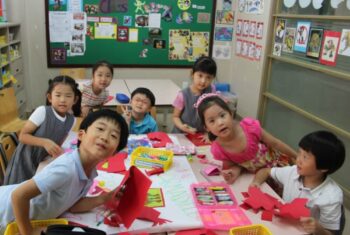What Is A Hagwon? Unpacking The Secrets Of South Korea’s Popular Learning Centres
Join a global community of over 200,000 TEFL teachers working throughout the world! Enrol me!
You ever heard of a hagwon? Do you know what a hagwon is?
South Korea has been one of the most popular destinations for teaching English abroad, and remains so. Tens of thousands of TEFL teachers come to South Korea each year into jobs teaching English in public schools and private schools.
These private schools are known as hagwons.
Read more: Teach English in South Korea
What is a hagwon?
In the Korean school system, you can teach in a public school, an international school, a private school or a hagwon. A hagwon is a private language institute.
The word hagwon in English does not exist. In other words, there is no English equivalent of the word hagwon, which is why we talk about hagwons using the Korean word. What does hagwon mean? It’s the name given to a for-profit private educational institution.
Students attend hagwons for lessons in English, Taekwondo, maths, art and science.
How many hagwons are there in Korea? There are approximately 80,000 hagwons in South Korea. There are more than 24,000 hagwons in Seoul alone. Approximately 75% of elememtary and high school students attend a hagwon every day.

Hagwons vs Korean public schools
As we’ve said, a hagwon is a private after-school centre. There are many ways to teach in Korean public schools. One example is the EPIK program. There is also GEPIK, SMOE and TaLK. Which school you want to work in depends on your own needs and preferences.
Read more: The Lowdown on Teaching English in South Korea
EPIK vs hagwon
There are a number of differences between working in a hagwon and working in a public school through one of the government programs. For our purposes, we’ll refer to the EPIK program by way of comparison.
Here are the main differences between teaching English in the EPIK program or in a hagwon.
Working hours
- In a public school, the working hours are generally 8.30am – 4.30pm.
- In a hagwon you can work from 2pm – 8pm or even 10pm.
- Overall working hours are longer in a public school, but your teaching hours will be fewer than in a hagwon.
- In other words, public schools require you to be at the school even when you’re not teaching. At hagwons, you’ll be teaching most of the time you’re there.
Class sizes
- Public school classes are bigger than in a hagwon. In a public school you can have around 30 students.
- In a hagwon you’re not likely to have more than 20.
Classroom resources
- Classrooms in hagwons are generally better equipped and have more resources than those in public schools.
Teaching
- In a public school you are likely to be the only foreign teacher in the school. But you will work alongside a Korean co-teacher. This may or may not be beneficial, depending on you and the co-teacher!
- Your co-teacher is the one to take the lead in the classroom. This means that you won’t be expected to do as much lesson planning, but more following instructions from your co-teacher. Some teachers say they feel like teaching assistants. Again, this isn’t necessarily a bad thing if you are a new teacher.
- In a hagwon you are solely in charge of your lessons – from lesson planning to execution. As a result, you have a lot more freedom to do what you want in your lessons, but it’ll also be more work!
Students
- The level of English of your students is higher in hagwons than in public schools.
- In a hagwon you can teach adults as well as kindergarten, primary and high school students.
- In public schools you won’t teach adults.
Benefits
- Both public schools and hagwons offer generous salary packages, usually including flights and accommodation.
- Public schools offer generous holiday packages.
- Hagwons usually offer 10 days vacation a year, but this is to be negotiated with the school.
- Salaries are slightly higher in hagwons.
Hiring
- Hagwons hire year-round.
- Programmes like the EPIK only hire twice a year and competition is stiff.
- A program places you in a school in a location, so you have no say over where you are going to live or work.
- You can choose which hagwon you want to apply to, so ultimately you can decide where you want to live and work.

Here is an example of part of a job advert on The TEFL Academy’s Jobs Board in August 2024. This job ad is for EPIK:
Financial Benefits:
- Competitive Salary: EPIK teachers earn a generous salary ranging from 2.2 million to 2.8 million KRW per month, depending on qualifications and experience
- Entrance Allowance: A payment of 1.8 million KRW is provided to cover your flight to South Korea
- Settlement Allowance: A one-time payment of 300,000 KRW is provided to assist with settling into a new home
- Severance Pay: Teachers receive severance pay based on their length of service
Housing Benefits:
- Free Furnished Housing: EPIK teachers are provided with rent-free, furnished single accommodations
Additional Benefits:
- Medical Insurance: 50% of the monthly medical insurance premium is covered by the EPIK program
- Paid Vacation: Teachers receive 26 paid vacation days per year
- Professional Development: Opportunities for professional development are available, including workshops, conferences, and online courses
- Cultural Experiences: EPIK teachers have the chance to immerse themselves in Korean culture through language classes, cultural events, and travel opportunities
Requirements - Be a citizen of one of the following countries: Australia, Canada, Ireland, New Zealand, South Africa, the United Kingdom, or the United States (due to visa requirements)
- Attended an English-medium school from grades 7-12 in the previously mentioned countries
- Hold a Bachelor’s degree from an accredited university in one of the countries previously mentioned
- Have a clean criminal background check
- TEFL Level 5
- Be in good physical and mental health
This is a job ad for a hagwon, posted in August 2024:
JOB SPECIFICATIONS
- School Type: Private School
- Location: Nationwide, Seoul, Gyeonggi, Incheon, Busan, Jeju, Daejeon, Cheonan, Gwangju, Jeonju, Daegu, Ulsan
- Airfare: Provided Free
- Accommodation: Single housing provided Free (Larger housing will be provided for Couples)
- Distance from School: 10-15 mins
- Age Group: Kindergarten-Elementary-Junior High
- Class Size: 10 students
- Working Days: M-F (No Weekends)
- Schedule of working Hours: 9am-6pm or 1pm-9pm
- Salary: 2.3M KRW – 3.0M KRW
- Severance Pay: One Month
- Vacation Days: 10 days, All the National Holidays
- Sick Leave: 3 days
- Health Insurance: 50% Support
- Training/orientation: Provided
- Contract length: 1 year (Renewable)
Are hagwons really that bad?
Hagwons have a bad reputation, both inside and outside South Korea. For the Korean students, the entire Korean education system is focussed on long study hours. The academic rigour is intense. The main aim of achieving high academic scores in schools is to get acceptance into prestigious universities. This often results in a heavy focus on test preparation and rote learning, rather than the learning of knowledge for life skills.
It’s common knowledge that Korean students attend a full day of school, then a few hours of extra studying at a hagwon, only to return home late at night to complete their homework. Some students attend more than one hagwon each day to study different subjects. Students are known to go to bed at about midnight. Obviously this is not a suitable schedule for a learner.
Thankfully, there is a growing awareness of this problematic focus on academics. In recent years, there have been curfews and other restrictions set on hagwons. But there have not been any significant lasting changes. Hagwons are still big business in South Korea – and still offer opportunities for TEFL teachers to teach English in South Korea.
If you choose to teach English in a hagwon in South Korea, here are our top tips for teaching at a hagwon in South Korea:
- Set up a number of interviews for different hagwons. There are enough teaching positions at hagwons that you can be picky.
- Prepare a lesson plan and demo lesson for your interviews. It’s likely you’ll be asked to present either of those.
- In your interview, don’t forget to ask about working hours, pay rates and holidays.
- Don’t accept the first offer you are given. Shop around.
- Do your due diligence. Look up any hagwon you are interested in on the internet. Ask for reviews on reddit.
Whichever route you go to teach English in Korea, popular opinion is that you shouldn’t rely on your orientation and training offered by your employer to prepare you adequately for your teaching journey. It’s a better idea to make sure you have a solid TEFL course under your belt before you apply for a position or a program in Korea.
Besides giving you an advantage over other applicants, it will stand you in good stead for the classroom. The Level 5 TEFL Course from The TEFL Academy is exactly what you need to prepare you to teach English in South Korea. It gives not only you, also your employer the confidence that you will be a competent and effective TEFL teacher.
TTA alumna Fiona Thomson made the jump from life in London to working in a hagwon in Seoul:
I found a job in Seoul about 7 weeks after completing the course and before I knew it I was on a plane headed to Incheon airport! I had found a position at a Hagwon (private school), which can have a bit of a bad reputation but I researched into the school and talked to former tutors so knew I had made a good decision.
My flat was in Hongdae which is a great place to go out and have fun in Seoul, the nightlife was a lot better than I had expected! My journey to work was roughly 30 mins on the tube and I worked regular hours from Monday –Friday.
Going into the school the first thing I noticed was how well behaved and adorable all my students were. I must admit I was really nervous going into a classroom for the first time but I was teaching 5-11 years olds and I quickly became a thing of fascination to them. It was really rewarding to see their English improve over the year.
I had a great year teaching and made some amazing memories and friends for life. There were a few other foreign teachers at my school so we would all go out and socialise at the weekend. In my first summer there, a couple of us went to a Korean music festival – I will never forget dancing in the rain to a Korean Beatles cover band! I also got to explore a completely new country and try some crazy unknown foods!
It was the best thing I could have done and even though it felt daunting, I think everyone should try it at least one time in their life! I felt very lucky to have an opportunity to teach, travel and save money at the same time.
Interested? Head on over to our Jobs Board and start looking for jobs!
1“Why S.Korea’s Crackdown on Private Tutoring Is Just A Band-Aid On A Much Larger Problem”
Time Magazine, July 7, 2023 [accessed online September 10, 2024].
https://time.com/6292773/south-korea-crackdown-hagwons-cram-schools-competition/
Accreditation & Quality Assurance
The TEFL Academy was the world’s first TEFL course provider to receive official recognition from government regulated awarding bodies in both the USA and UK. This means when you graduate you’ll hold a globally recognised Level 3 (120hr) Certificate or Level 5 (168hr) Diploma, meaning you can find work anywhere and apply for jobs immediately.
 United Kingdom
UK
United Kingdom
UK















